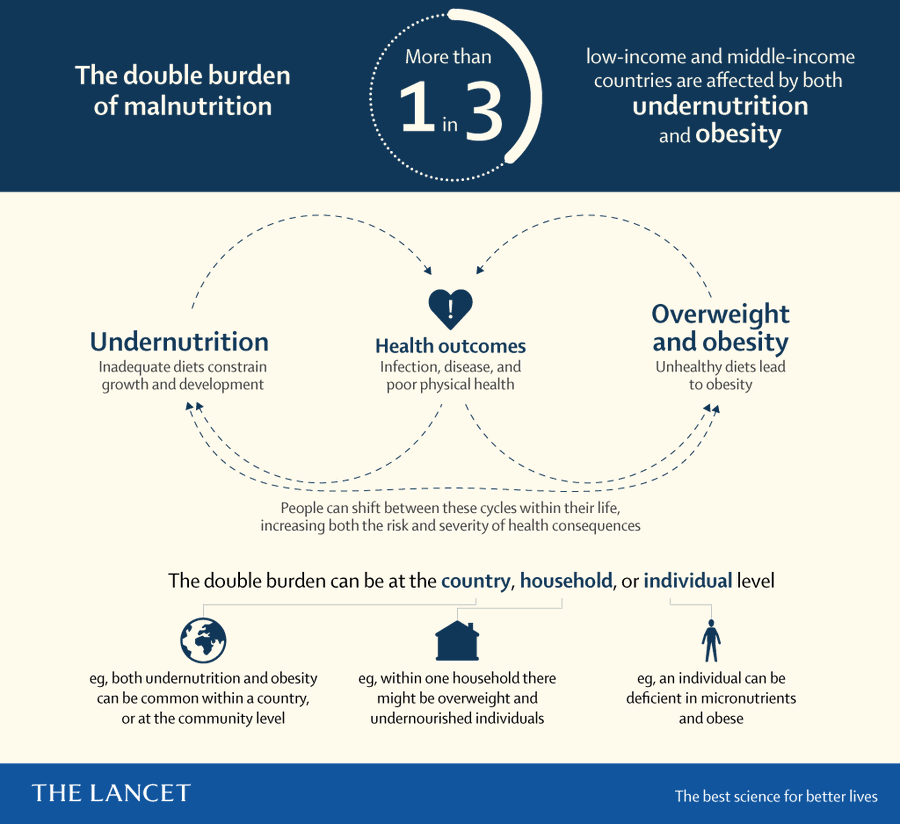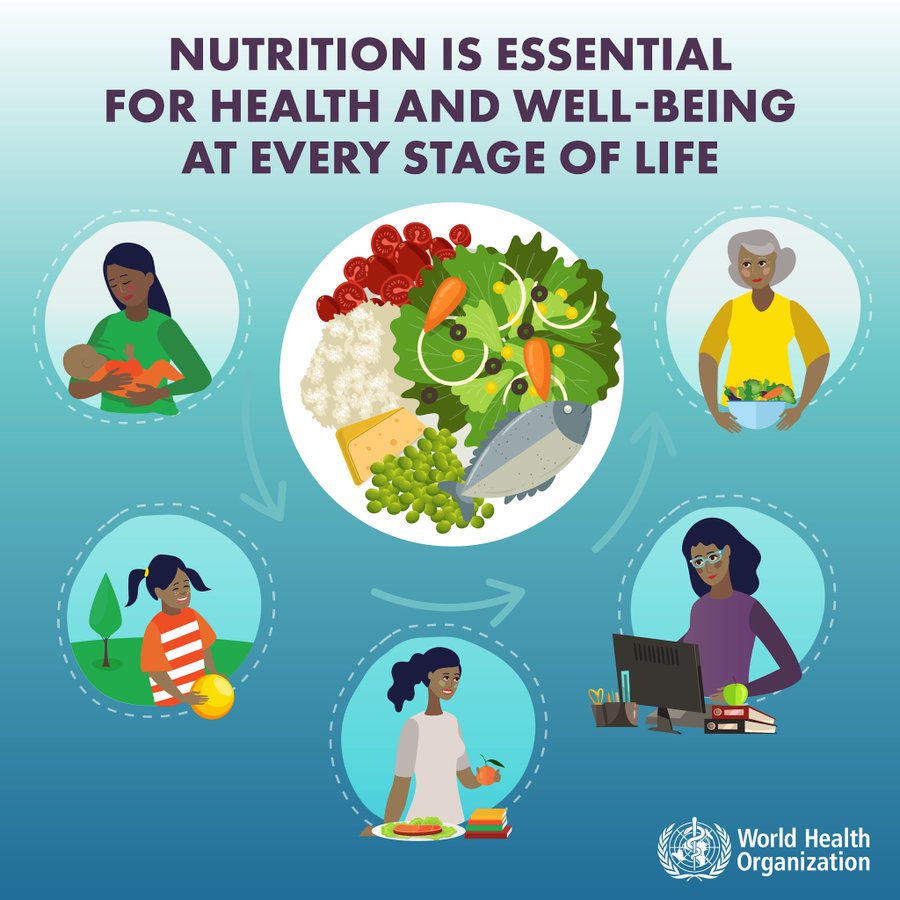Top Global Scientists Call for 'Profound Food System Transformation' to Combat Extreme Malnutrition
Published on
by
Unless radical changes are made, warns the lead author of a new WHO report, "the growth and development of individuals and societies for decades to come" are at risk.
by

A new multi-paper World Health Organization report published Monday in The Lancet details the need to overhaul global food systems to address mass malnutrition. (Photo: Bartosz Hadyniak/Getty Images)
A multi-part World Health Organization report published Monday in the British medical journal The Lancet detailed the need to urgently transform the world's failing food systems to combat the coexistence of undernourishment and obesity—or the "double burden of malnutrition."
"Without a profound food system transformation, the economic, social, and environmental costs of inaction will hinder the growth and development of individuals and societies for decades to come."
—Francesco Branca, WHO
—Francesco Branca, WHO
Based on global data from recent decades, the WHO report estimated that more than 150 million children are stunted worldwide while nearly 2.3 billion children and adults—about 30% of the planet's human population—are overweight.
Dr. Francesco Branca, the report's lead author and director of the WHO's Department of Nutrition for Health and Development, said that "we can no longer characterize countries as low-income and undernourished, or high-income and only concerned with obesity."
As he put it: "We are facing a new nutrition reality."
This new reality "is driven by changes to the food system, which have increased availability of ultra-processed foods that are linked to increased weight gain, while also adversely affecting infant and pre-schooler diets," said co-author and University of North Carolina professor Barry Popkin. "These changes include disappearing fresh food markets, increasing supermarkets, and the control of the food chain by supermarkets, and global food, catering and agriculture companies in many countries."
Considering these changes, Branca explained that "all forms of malnutrition have a common denominator—food systems that fail to provide all people with healthy, safe, affordable, and sustainable diets."
"Changing this will require action across food systems—from production and processing, through trade and distribution, pricing, marketing, and labeling, to consumption and waste," he added. "All relevant policies and investments must be radically re-examined."
This is especially true for the more than a third of low- and middle-income countries that face "the two extremes of malnutrition." A WHO statement highlighted the following regions: sub-Saharan Africa, south and east Asia, and the Pacific.
More than one in three low-income and middle-income countries face both extremes of #malnutrition. NEW Series with @WHO calls for a new global #foodsystems approach to help reduce #undernutrition and #obesity at the same time hubs.ly/H0mfY8f0
Authors of the WHO report urged world governments, the United Nations, civil society, academics, the media, donors, the private sector, and economic platforms to pursue fundamental changes to global food systems with the aim of ending mass malnutrition. Doing so, according to the authors, means seeking assistance from grassroots groups, farmers and their unions, faith-based leaders, advocates for planetary health, leaders of green companies, local politicians, and consumer associations.
"Given the political economy of food, the commodification of food systems, and growing patterns of inequality worldwide, the new nutrition reality calls for a broadened community of actors who work in mutually reinforcing and interconnected ways on a global scale," said Branca. "Without a profound food system transformation, the economic, social, and environmental costs of inaction will hinder the growth and development of individuals and societies for decades to come."
The report acknowledged that fighting malnutrition requires successfully promoting healthier diets, which WHO defines as: optimal breastfeeding practices in the first two years; a wide variety of fruits and vegetables, whole grains, fiber, nuts, and seeds; and limited amounts of animal products—particularly processed meats—as well as foods and beverages high in sugar, saturated fat, trans fat, and salt.
Healthy diets means:
-optimal practices in the first 2 years
practices in the first 2 years
-a diversity & abundance of
 , wholegrains, fibre, nuts, seeds
, wholegrains, fibre, nuts, seeds
-modest amounts of animal products
-min. processed meat
-min. foods & beverages high in energy & added amounts of sugar, saturated fat, trans fat,
-optimal
 practices in the first 2 years
practices in the first 2 years-a diversity & abundance of

 , wholegrains, fibre, nuts, seeds
, wholegrains, fibre, nuts, seeds-modest amounts of animal products
-min. processed meat
-min. foods & beverages high in energy & added amounts of sugar, saturated fat, trans fat,

"Today's publication of the WHO Series on the Double Burden of Malnutrition comes after 12 months of Lancet articles exploring nutrition in all its forms," wrote The Lancet editor-in-chief Dr. Richard Horton in an editorial accompanying the report.'
"With these and other articles across Lancet journals throughout 2019, it has become clear that nutrition and malnutrition need to be approached from multiple perspectives," Horton continued, "and although findings have sometimes converged, there is still work to be done to understand malnutrition's multiple manifestations."
In January, as Common Dreams reported, more than three dozen experts with the EAT-Lancet Commission called for a "global agricultural revolution" and people worldwide to adopt a "planetary health diet" to tackle the harmful nutritional and environmental impacts of the world's unhealthy, unsustainable food system.
Co-lead commissioner Dr. Walter Willett of Harvard University explained at the time that "to be healthy, diets must have an appropriate calorie intake and consist of a variety of plant-based foods, low amounts of animal-based foods, unsaturated rather than saturated fats, and few refined grains, highly processed foods, and added sugars."
Our work is licensed under a Creative Commons Attribution-Share Alike 3.0 License. Feel free to republish and share widely.





0 Comments:
Post a Comment
Subscribe to Post Comments [Atom]
<< Home